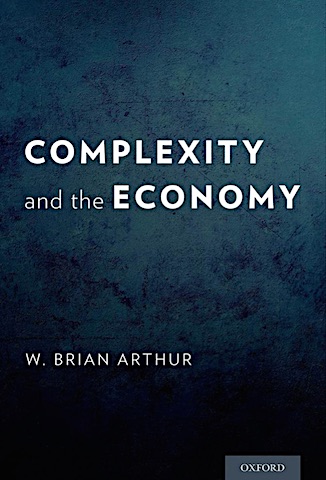Book: Complexity and the Economy
 Oxford University, Oct 2015
Oxford University, Oct 2015
From the cover: "Economics is changing. In the last few years it has generated a number of new approaches. One of the most promising - complexity economics - was pioneered in the 1980s and 1990s by a small team at the Santa Fe Institute. Economist and complexity theorist W. Brian Arthur led that team, and in this book he collects many of his articles on this new approach. The traditional framework sees behavior in the economy as in an equilibrium steady state. People in the economy face well-defined problems and use perfect deductive reasoning to base their actions on. The complexity framework, by contrast, sees the economy as always in process, always changing. People try to make sense of the situations they face using whatever reasoning they have at hand, and together create outcomes they must individually react to anew. The resulting economy is not a well-ordered machine, but a complex evolving system that is imperfect, perpetually constructing itself anew, and brimming with vitality.
"Complexity economics holds that the economy is not necessarily in equilibrium, that computation as well as mathematics is useful in economics, that increasing as well as diminishing returns may be present in an economic situation, and that the economy isn't something given and existing but forms from a constantly developing set of institutions, arrangements, and technological innovations.
"The new vision complements the standard one, and it helps answer many questions: Why does the stock market show moods and a psychology? Why do high-tech markets tend to lock in to the dominance of one or two very large players? How do economies form, and how do they continually alter in structure over time?
"The papers collected here were among the first to use evolutionary computation, agent-based modeling, and cognitive psychology. They cover topics as disparate as how markets form out of beliefs; how technology evolves over the long span of time; why systems and bureaucracies get more complicated as they evolve; and how financial crises can be foreseen and prevented in the future."